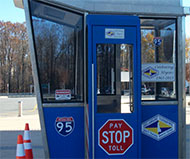5/27/2020
Tolling Industry Wants $9.2 Billion Taxpayer BailoutToll road association asks congressional leadership for $9.2 billion in taxpayer funds to make up for lost toll revenue.

Advocates of toll roads insist that paid roads are a private sector solution to transportation problems. The nationwide shutdown in response to the Covid-19 virus scare revealed what happens when toll roads run into financial difficulty -- taxpayers wind up on the hook. The International Bridge, Tunnel and Turnpike Association (IBTTA) wrote to congressional leaders last month seeking a federal bailout.
"We now ask Congress to take significant action to help the US tolling industry in the next Covid-19 legislation, the Phase 4 emergency relief and economic recovery package," IBTTA President Samuel Johnson and IBTTA CEO Patrick Jones wrote. "Specifically, we request $9.245 billion in flexible federal funding to offset the huge loss in toll revenues expected in the next 12 months."
The toll road advocacy group calculates monthly toll revenue losses will peak at 75 percent in June, and continue down 15 percent through March 2021. This would amount to a total loss of $9.2 billion, according to the organization's forecast. Fitch Ratings monitors the financial health of various investments and reduced the bond ratings or declared a "negative" outlook for toll roads including Florida's Mid-Bay Bridge Authority and Osceola Parkway, Virginia's Dulles Greenway and Elizabeth River Crossing and the South Jersey Transportation Authority. The ratings agency forecasted a "stable" outlook for roads with the flexibility to pass along substantial toll hikes to motorists.
"The Rating Watch Negative reflects the pending approval of a proposed toll increase and uncertainty of implementation given the current environment, which would improve the authority's financial profile," Fitch explained in its decision on the New Jersey operator of the Atlantic City Expressway toll road. "Under the revised rating case the average debt service coverage ratio is narrow at 1.2x from 2021 through 2025, without incorporating a toll increase. The authority is in the process of holding public hearings for an approximately 37 percent toll increase followed by annual increases indexed to inflation."
Financial failures are common in the tolling industries. One of the first "public-private partnerships" to go under was the 91 freeway high occupancy toll lanes in Orange County, California, with county taxpayers in 2003 paying for more than the original cost of construction to buy back the project from a foreign company. More recently, the SH130 toll project in Austin, Texas, went under. The Cesar Chavez toll lanes in El Paso were likewise found to be non-viable in 2017. The Indiana Toll Road went bankrupt in 2014. San Diego's South Bay Expressway went bankrupt in 2010 and was bought out by county government. California's Foothill-Eastern Transportation Corridor Agency, which runs the 241, 261 and 133 toll roads in Orange County, has been teetering on the edge of default despite $1.7 billion in subsidies from the taxpayer.
In South Carolina, the Greenville Southern Connector went bankrupt in 2010. Transurban, the Australian company that runs the Pocahontas Parkway in Richmond, Virginia, wrote down the toll road as having a value of $0 in 2012.
An US Department of Transportation inspector general investigation last year found the Federal Highway Administration did not provide sufficient oversight for tolling projects receiving taxpayer support (view report).


